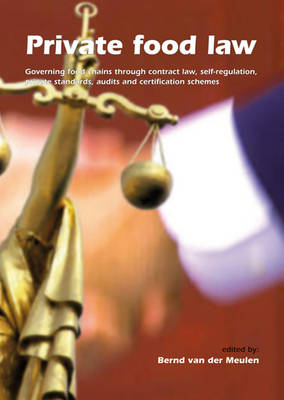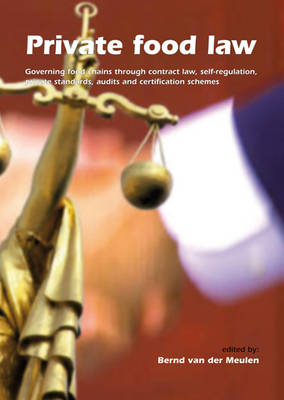
- Afhalen na 1 uur in een winkel met voorraad
- Gratis thuislevering in België vanaf € 30
- Ruim aanbod met 7 miljoen producten
- Afhalen na 1 uur in een winkel met voorraad
- Gratis thuislevering in België vanaf € 30
- Ruim aanbod met 7 miljoen producten
Zoeken
Private food law
governing food chains through contract law, self-regulation, private standards, audits and certification schemes
Bernd Van Der Meulen
€ 207,95
+ 415 punten
Omschrijving
Since the turn of the Millennium, world-wide initiatives from the private sector have turned the regulatory environment for food businesses upside down. For the first time in legal literature this book analyses private law initiatives relating to the food chain, often referred to as private (voluntary) standards or schemes.Private standards are used to remedy flaws in legislation, in order to reach higher levels of consumer protection than the ones chosen by the EU legislature and to manage risks and liability beyond the traditional limits of food businesses. We see that litigation is no longer solely framed by legislative requirements, but ever more by private standards such as GlobalGAP, BRC, IFS, SQF and ISO. These private standards incorporate public law requirements thus embedding them in contractual relations and exporting them beyond the jurisdiction of public legislators. Other standards focus on corporate social responsibility or sustainability. This book also addresses how private religious standards such as Kosher and Halal play a role in defining specific markets of growing importance. It is noted that organic standards have found an interesting symbioses with public law.Another development on this topic is that food businesses are inspected more often by private auditors than by public inspectors. Effects in terms of receiving or being denied certification far outweigh public law sanctions. In short private law has changed an entire legal infrastructure for the food sector. It emerges as competing with the public law regulatory infrastructure.This book is of interest to all who concern themselves with food law legislation and litigation and the evolving role of private standards on changing the landscape of food chains and innovation.
Specificaties
Betrokkenen
- Auteur(s):
- Uitgeverij:
Inhoud
- Aantal bladzijden:
- 436
- Taal:
- Engels
- Reeks:
- Geïllustreerd:
- Ja
Eigenschappen
- Productcode (EAN):
- 9789086861767
- Verschijningsdatum:
- 5/10/2011
- Uitvoering:
- Paperback
- Formaat:
- Trade paperback (VS)
- Afmetingen:
- 170 mm x 240 mm
- Gewicht:
- 680 g

Alleen bij Standaard Boekhandel
+ 415 punten op je klantenkaart van Standaard Boekhandel
Beoordelingen
We publiceren alleen reviews die voldoen aan de voorwaarden voor reviews. Bekijk onze voorwaarden voor reviews.








